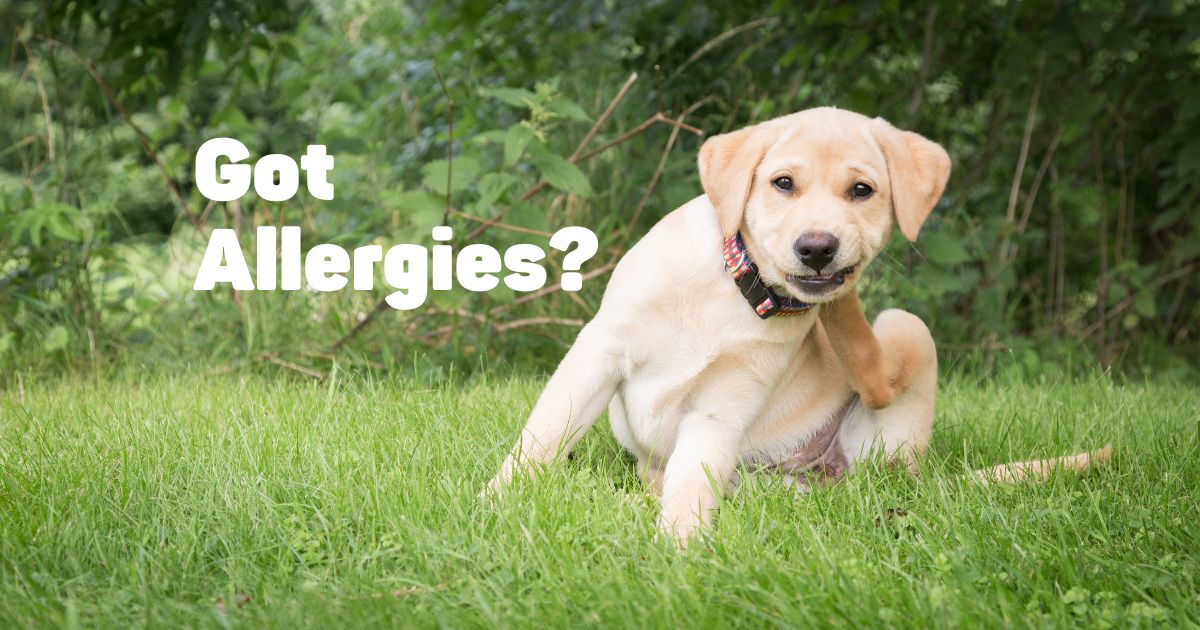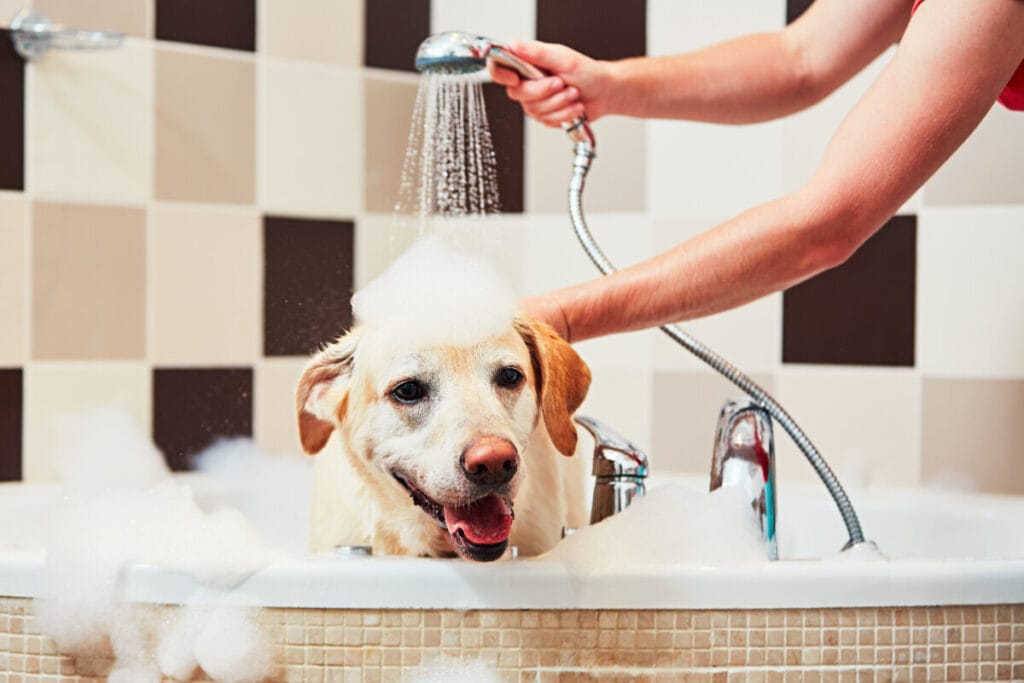Labrador Retrievers and Allergies: What You Need to Know
Labrador Retrievers are amazing dogs, but they, too, are prone to get allergies. Retrievers can have allergies to many things, like flea bites, grass, and food, to name a few. In this article, I’ll walk you through dog allergies and help give you some recommendations on what you can try to help get some relief for your lab.

People who read this article also read: What Sheds Less: Lab or Golden and Labrador Retrievers With Red Eyes. I thought you might want to bookmark them for future reading.
Labrador Retrievers are one of the most popular dog breeds in the world. These lovable dogs are known for their friendly nature, intelligence, and loyalty.
However, like all dogs, they can suffer from allergies. Understanding the common allergies that affect Labrador Retrievers can help owners take steps to manage their pet’s health and well-being.
Food allergies are a common problem in dogs, including Labrador Retrievers. Certain ingredients in commercial dog food, such as beef, corn, soy, fish, wheat, chicken, and chicken eggs, can trigger an allergic reaction in some dogs.
Symptoms of food allergies in dogs can include itchy skin, hair loss, and gastrointestinal problems. By identifying and avoiding these allergens, owners can help their pets live a healthier, happier life.
Understanding Allergies in Labrador Retrievers
Unfortunately, labradors are prone to allergies, just like any other breed. This section will discuss allergies in Labrador Retrievers, including what they are, common allergens, symptoms, diagnosis, and treatment.
What are Allergies?
Allergies are an abnormal response of the immune system to usually harmless substances. When the immune system overreacts to these substances, it releases histamines that cause inflammation and itching.
In dogs, allergies can manifest in various ways, including skin irritation, itching, sneezing, and respiratory issues.
Common Allergens for Labrador Retrievers
Labrador Retrievers can be allergic to various substances, including:
- Food allergens (beef, chicken, soy, chicken eggs, fish, and rice)
- Environmental allergens (pollen, dust, mold, and plant)
- Contact allergens (flea bites, saliva, urine, and dander)
- Inhaled allergens (pollen, mold, and dust)
Symptoms of Allergies in Labrador Retrievers
The symptoms of allergies in Labrador Retrievers can vary depending on the allergen. Common symptoms include:
- Itching, especially around the face, paws, and ears
- Hair loss and scaling
- Inflamed patches of skin
- Constant licking and scratching
- Sneezing and respiratory issues
- Diarrhea and vomiting

Diagnosis and Treatment of Allergies in Labrador Retrievers
If you suspect that your Labrador Retriever has allergies, you should take them to a veterinarian. The veterinarian will perform a physical exam and may recommend the following tests:
- Skin test: The veterinarian will inject small amounts of allergens into the dog’s skin to see if there is a reaction.
- Blood test: The veterinarian will draw blood and test for immunoglobulin E (IgE), which is produced when the dog is exposed to an allergen.
Once the allergen is identified, the veterinarian will recommend treatment options, which may include:
- Elimination diet: The veterinarian will recommend a hypoallergenic diet to determine if food allergies are the cause.
- Medications: The veterinarian may prescribe antihistamines, steroids, or antibiotics to treat secondary infections.
- Immunotherapy: The veterinarian may recommend immunotherapy, which involves injecting the dog with small amounts of the allergen to desensitize their immune system.

In addition to medical treatment, you can also take steps to manage allergies in your Labrador Retriever, such as:
- Grooming and bathing your dog regularly to remove allergens from their coat
- Using air purifiers and frequently vacuuming to reduce environmental allergens
- Using flea preventatives to prevent flea allergies
Allergies in Labrador Retrievers are a common issue that can be managed with proper diagnosis and treatment. If you suspect that your dog has allergies, take them to a veterinarian for proper diagnosis and treatment.
Preventing Allergies in Labrador Retrievers
If you have a Labrador Retriever, you know how much they love to play and run around. However, allergies can make it difficult for your dog to enjoy their favorite activities. Fortunately, there are several ways to prevent allergies in Labrador Retrievers.
Hypoallergenic Breeds
While there is no such thing as a completely hypoallergenic dog, some breeds are less likely to cause allergic reactions than others. If you or someone in your household is allergic to dogs, consider choosing a breed that sheds less and produces less dander. Some hypoallergenic breeds include:
- Poodle
- Bichon Frise
- Maltese
- Portuguese Water Dog
*Special Note: If you need an allergy-friendly dog, my sister-in-law has a Bichon, and we have a mini Goldendoodle in addition to our retriever. Both are great dogs. You can learn more about the pros and cons of a Goldendoodle here in an article I wrote for the Goldendoodle Advice website.
Grooming and Bathing
Regular grooming and bathing can help prevent allergies in Labrador Retrievers. Here are some tips to keep your dog clean and healthy:
- Brush your dog’s coat regularly to remove loose hair and dander.
- Use a high-quality dog shampoo for bathing your dog once a month or as needed.
- Keep your dog’s ears clean and dry to prevent ear infections.
- Trim your dog’s nails regularly to prevent them from scratching and causing skin irritation.

Environmental Management
Environmental allergies can be difficult to prevent, but there are some steps you can take to minimize your dog’s exposure to allergens:
- Keep your home clean and dust-free by vacuuming and wiping down surfaces regularly.
- Use air purifiers to remove allergens from the air.
- Wash your dog’s bedding and toys regularly to remove allergens.
- Avoid walking your dog during peak allergy seasons, such as spring and fall.
By following these tips, you can help prevent allergies in your Labrador Retriever and keep them healthy and happy.
Here’s More About Labs
Here are more popular articles you may want to explore:
Conclusion
As with all breeds, labs can develop allergies that can cause discomfort and distress. In this article, we have discussed the common allergies that Labradors can develop and some simple ways to help alleviate their symptoms.
It is important to note that while some breeds may be more susceptible to certain types of allergies, any dog can develop an allergy. It is essential to keep an eye out for signs of allergies in your dog, such as itching, redness, and swelling, and to seek veterinary care if necessary.
If you suspect that your Labrador has an allergy, there are several steps that you can take to help alleviate their symptoms. These include:
- Identifying and avoiding the allergen
- Providing a hypoallergenic diet
- Regular grooming and bathing to remove allergens from their coat
- Using medication prescribed by a veterinarian
Remember that allergies can be managed, but they cannot be cured. It is important to work with your veterinarian to develop a plan that is tailored to your dog’s specific needs.
Allergies can be a challenge for Labrador Retrievers and their owners, but with proper care and attention, your dog can lead a happy, healthy life.
By staying vigilant and working with your veterinarian, you can help mitigate your dog’s symptoms and ensure that they are comfortable and happy.

